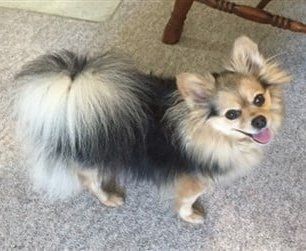Pomeranian Showing Weakness and Lethargy
Overview
The Pomeranian breed is known for being alert, active and lively. So, it's easy to notice when a Pom suddenly begins to act overly tired and is certainly a reason to take note.
While there are some very common reasons that may cause a dog to seem fatigued, there are also some health issues that can cause this as well.
This section will discuss the energy level to expect with this breed. We will also cover all of the possible reasons why a Pomeranian may act sleepy or tired for puppies, adults and seniors.
Please note:
PetPom is reader-supported, and some of the product suggestions on this page are affiliate links. As an Amazon Associate we earn from qualifying purchases. This is at no extra cost to you and helps us continue providing free, high-quality information.
Timon, photo courtesy of Laura Montanez
Energy Levels to Expect
The Pomeranian breed is an active dog. Despite his small size, he has quite a bit energy. He also closely bonds with is owner, and many Pomeranians will push themselves to keep up until they reach the point of exhaustion. For example, let's say that an owner is busy cleaning the house… a Pom will often stay by his owners side and follow her from room to room as she goes about her tasks.
The Pom may feel very sleepy
and ready for a nap, however the urge to remain close and have his human's companionship often outweighs his urge to rest. After a while, the Pom may get so tired that when he's finally brought to his resting area, he conks right out.
With little legs carrying a little body, it takes more out of a Pomeranian to keep up than his larger counterparts.
Scampering around the house may not seem like
exercise, however over the course of a day if a Pom is moving around quite a bit, he can tire out just from that.
Puppies are special little creatures and oh-so cute. It is very typical for a Pom puppy to be supercharged with energy, romping all round, rolling over like a silly-head and bopping from here to there, only to tire out in a matter of seconds and fall asleep right where he is.
The energy level of puppies is like a roller coaster; so it is normal for a puppy to have intermittent time of being active, tiring and then napping.
As he matures, this will level out. When the Pom reaches his one year mark, he will nap a lot less and sleep better though the night.
Poms of any age up to about 8 years old should have good amount of energy, be alert to their surroundings, be ready to play, walk and accompany owners outside of the house.
An adult may take a nap or two here and there or may need some windows of relaxation, however he/she should not be overly tired and if this is noticed it can point to an issue as we will discuss ahead.
Senior Pomeranians can tire much easier than their adult counterparts, and in many cases this is a natural part of the aging process. However, marked tiredness that suddenly comes on can point any number of health problems, which we will go over next.
Reasons Why a Pomeranian Puppy May Act Tired
As we touched on, it is normal for a Pom puppy to have a lot of energy and when you couple that with a high level of curiosity, you have a pup that is full with vigor and intentions, but simply cannot handle staying up for all he wants to do and all he wants to see.
Young puppies can sleep up to 18 hours per day, so this means that it is normal for them to tire out and take several naps during the day.
With this said, there are some health conditions
to be aware of. The most common one is hypoglycemia which refers to a rapid drop in blood sugar levels. Some cases do not have any specific cause other than age, however in some instances this can quickly develop due to either not eating often enough or due to stress (which can include feelings of be overwhelmed in a new house, etc.).
Lulu, photo courtesy of Ellie Williams
The elements that make this different than just being lethargic due to playing and needing to rest is that it comes on very quickly and the pup often shows other signs including:
Trouble walking
-
The puppy may have a 'drunken' gait and be very wobbly.
Dizziness -
As with the stumbling gait, a pup may bump into walls, etc.
Confusion -
Similar to the above two symptoms, the pup may seem 'out of it' and not thinking clearly.
What to do -
If this is suspected, an owner may wish to try and treat this at home by rubbing a bit of honey onto the puppy's gums. This is one of the best at-home methods to send sugar quickly into the bloodstream. It should be noted that moderate to severe cases need to be treated by the veterinarian who may need to use IV intervention to bring blood sugar levels back to normal.
Why a Pomeranian of Any Age May Seem Overly Tired
Whenever a dog acts out of character and is simply not himself, acting lethargic, mopey or otherwise showing signs of being drained out, it is important for owners not to pass this off.
While a dog can just be having an 'off' day, if a Pomeranian is overly tired for more than 24 hours and sleeping does not seem to resolve things, this often points to an environment factor, a health issue or an issue with the atmosphere of the household.
Health issues:
If a dog is feeling ill or is in pain, he often will either retreat and want to rest or he may act overly clingy. Some will go back and forth, and this can confused owners even more.
The majority of health issues have fatigue or lethargy as a symptom. Since weakness can be the initial symptom to manifest at the beginning stage of many illnesses and diseases, this is often noticed first before any other indications. Additionally, if a Pom is ill there may be a fever
present that is not noticed by owners.
If a Pomeranian is acting lethargic and has trouble rising from a down position this can point to hip problems or nerve damage. Added signs of decreased appetite
and changes in stool are other common signs of illness that may be developing as well.
Just a few of the possible issues that may cause lethargy include:
- Diabetes
- Heart problems
- Heartworms
- Hookworms
- Hypothyroidism
- Infection (including distemper, parvo and leptospirosis)
- Leukemia
- Liver disease
- Poisoning
Even if there are no other symptoms and even if your Pom has just had an exam, it is important to bring the dog in for a full physical. The veterinarian should perform a CBC (complete blood count), urinalysis, and do a full body exam.
Ella Mae, photo courtesy of Carol Ruth
Dogs will have a better prognosis and more successful treatment the earlier that issues are diagnosed.
Therefore owners are encouraged to not delay a vet visit if lethargy without obvious emotional or environmental causes lasts for more than 24 hours or if sudden and severe weakness that interferes with walking and normal daily activities occurs for any length of time.
The heat:
Summer heat
can cause a Pom to quickly lose energy and seemed drained. When you couple this with possible dehydration, it can make a puppy or dog very weak.
It can really help to have a canine cooling mat like the the Green Pet Shop Self Cooling Pet Pad in size Small . This is body-activated, non-electrical gel mattress that safely absorbs heat from a dog's body.
. This is body-activated, non-electrical gel mattress that safely absorbs heat from a dog's body.
Placing a canine cooling vest is an option as well; be sure to choose a lightweight design like the digPets Hurtta Cooling Vest Harness for Pets
 , which comes in both xx-small and x-small.
, which comes in both xx-small and x-small.
Don't bring your Pom out during the hottest part of the day if at all possible, keeping walks to early morning and late evening. Encourage your pup or dog to drinks more water than normal; this can be done by offering water at times that you normally wouldn't, by bringing water with you whenever you venture out and by offering fun flavored ice cubes.
While it is perfectly fine to trim fur to create a nice rounded appearance, do not shave a Pom
in an effort to help with the heat; this only leaves the body exposed to sunburn, ruins the coat's ability to regrow properly and does not even help since dogs sweat from the paws and via breathing.
Environmental factors:
When a Pom acts tired and down in the dumps and all health issues have been ruled out, it may be due to a change in the environment.
This can be anything that has disrupted the Pom's normal routine and what he/she considers to be their 'life'.
This can be a move to a new house or other element that disrupts a normal schedule. In many cases, this will be a change in the make-up of the dog's 'pack'.
Examples are if a family member (human or animal) is no longer in the home, if a new family member has started living in the house or even if a favorite playmate such as a neighbor's dog is no longer available to interact with.
Dogs are emotional creatures and the Pomeranian breed is can become very attached to others. Therefore, if someone or something is no longer there, a Pom may be depressed and missing the relationship. If this is the case, it is important to note that things do often get better with time.
Losing another dog or a main caretaker can be exceedingly rough on a dog and there is often a period of mourning. A Pom may whine, have no interest in activities, have a decreased appetite and want to sleep all day.
Time does heal and as days pass by memories will fade somewhat and most dogs eventually return to normal behavior. One thing that can help an unmotivated, lethargic and depressed dog is to introduce a new activity that has never been done before.
Whether this is a walk along a river bank, playing in a children's pool outside on a summer's day or a trip to the local pet supply store to choose some new toys, an experience of something novel can perk up a Pom's mood and help him focus on something other than the thing that is making him sad.
Home Atmosphere:
While the most common reasons for a Pomeranian acting tired are related to some sort of health problem or a change in the house such as the departure of a family member, there are some instances when a Pom mimics the general mood of his owner or the general vibe of the household.
Lethargy with Senior Pomeranians
Older Poms will have a gradual slowing down and because this happens progressively owners may not notice until there is a striking difference in resting and sleeping needs compared to the dog's younger self.
Due to a lowered metabolism, senior dogs
need fewer calories to fuel the body so there is often a lowered food intake as well. Arthritis may cause the senior dog to have trouble sleeping, which causes him to nap more during the day.
With this said, sudden weakness is not a normal part of the aging process. There are many health issues common with older dogs that will cause the dog to be tired. This includes diabetes, arthritis and tooth infection.
Far too many seniors are silently suffering and not receiving proper veterinary care because owners pass off lethargy as normal behavior once a dog reaches a certain age.
Any noticeable changes in behavior, eating, exercise tolerance and/or activity levels should be reported to the veterinarian.
Severe Depression and Listlessness
Some dogs can experience a funk that goes beyond acting tired. This will include changes in behavior such as cowering under
a bed and other serious symptoms including a marked decrease in appetite that may even lead to weight loss.
If a dog is acting this way it is always vital rule out health issues and look to the household environment to see if any changes can be made.
In very rare cases, canines can be diagnosed with clinical depression. When it is so severe that it interferes with a dog's quality of life, medication intervention may be recommended. Some common medicines that are used to treat this include Paxil, Prozac or Zoloft. Most dogs respond quickly and can be weaned off medication after 6 to 9 months.
Summary
Just like humans, dogs have times of being tired and needing to rest. However, a wide range of health issues can cause weakness or lethargy long before other symptoms manifest.
In most cases, when a dog is acting so out of character that an owner questions if something is wrong, it usually is. Owners are encouraged to not delay bringing their Pomeranian in for a full checkup if the puppy or dog is acting overly tired.
You May Also Like:
Why does my Pomeranian bark so much
- While toy breeds often get the rap of being 'yappers', the Pomeranian is not necessarily an incessant barker. There are usually triggers that owners can train for.
The Best Supplies for a Pomeranian
- A list of what you'll want to have for optimal health, happiness, comfort, and safety.
The Benefits of Playpens for Pomeranians
- Having the right playpen can make a huge difference in several important ways.


-min-335x335-1920w.jpg)
-min-243x335-1920w.jpg)
-min-251x335-1920w.jpg)

-min-335x251-1920w.jpg)
-min-335x248-1920w.jpg)

